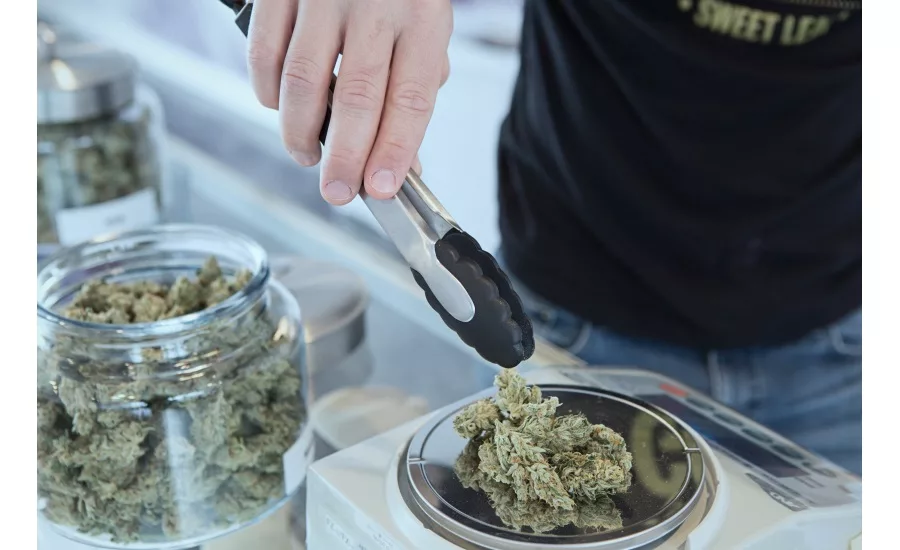Cannabis food and beverage safety: challenges and opportunities

On January 1, Illinois became the 11th U.S. State to legalize adult-use recreational marijuana. On that first day, Illinois’ 37 dispensaries sold more than $3 million dollars’ worth of cannabis products. That is an average of nearly $100,000 per store, in one day. In the first two weeks, sales surpassed $20 million. But for widespread product shortages and lines stretching for blocks, sales might have been much higher. Thirty-three U.S. states have enacted some form of legalized marijuana, with another dozen considering enacting or expanding legalization this year. This does not account for hemp—the primary source of CBD—which is legal at federal level, and which is projected to surpass $20 billion by 2024.
Cannabis companies and entrepreneurs have brought thousands of new products to market, including many foods and beverages. Despite the potentially lucrative opportunities, significant business, civil, and regulatory risks remain. For now, FDA continues to ban the use of CBD as food additive. Nevertheless, many companies have pressed forward with transnational sales of CBD infused foods and beverages. At the state level, a patchwork of inconsistent regulations has meant the edible cannabis industry is largely self-regulated, especially from a food and beverage safety standpoint. Without clear standards, it is especially important that companies are taking steps to mitigate food and beverage safety risks. Currently, two of the most pressing challenges pertain to dosing procedures and preventing contamination.
Dosing, which refers generally to the amount of active ingredient (typically CBD or THC) in a serving, presents a two-fold challenge for producers of cannabis edibles: serving size and homogeneity. Unfortunately, there is no standardized THC dosing protocol, and products that appear to be similar can have highly variable THC levels. Moreover, due to physiological differences and other variables (such as tolerance), effects are highly individualized. This paves the way for unwary consumers—who reasonably assume that a cannabis-infused food or beverage represents a single serving or dose—to have a very unpleasant experience. Put differently, whereas a 100mg serving of THC might cause only mild impairment in a long-time THC consumer, it could be incapacitating to someone trying cannabis for the first time. To alleviate the risks to consumers, producers must ensure the packaging of cannabis-infused foods and beverages contains enough information to both warn and educate consumers.
The other aspect of dosing is homogenization, which refers to the distribution of active ingredient in a product. Cannabis molecules tend to localize, which can lead to uneven distribution of the active ingredient—creating “hot spots” and irregular concentrations. This affects both THC and CBD infused products. Ensuring cannabis products are properly homogenized is vitally important for the safety of consumers and the well-being of your business. Uneven concentrations can lead to bad customer experiences as well as lawsuits and, in the worst case, criminal liability. For instance, if irregularly concentrated products are tested at the retail level, the results may show CBD or THC concentrations that are significantly higher or lower than claimed. To mitigate the risk, producers of cannabis-infused foods and beverages should conduct thorough potency testing of their products and develop homogenization procedures that will ensure reliably even distribution of active ingredients.
Another challenge is preventing contamination. Certainly, there are many similarities between traditional food and beverage safety and cannabis food and beverage safety. Cannabis, like any agricultural commodity, is at risk of becoming contaminated with microbes (i.e., pathogens, molds, and yeast), pesticides and heavy metals. However, there are also important differences.
Hemp in particular is a phytoremediator, meaning it draws contaminants from the soil into the plant. Thus, it is especially important to test for heavy metals and other environmental contaminants that hemp can uptake. Cannabis edibles and beverages are also unique inasmuch as they are frequently consumed for medical benefit by individuals who are immunocompromised, and thus especially vulnerable to illness. Consequently, developing interventions throughout the supply chain to ensure effective sanitation and cleanliness is extremely important. In addition to laboratory testing for pathogens, heavy metals, pesticides, and other environmental contaminants, companies should implement enhanced measures to improve traceability, eliminate cross contamination during processing, prevent ill employees from working, and ensure time and temperature controls.
To date, the cannabis industry has done a remarkable job of responsibly self-regulating. The ingenuity and innovation, from safety, to traceability, to packaging, to product development, has been extraordinary. With some form of legalization now enacted in most U.S. States, and a steady stream of promising health and medical findings, it appears that the policy of cannabis prohibition may be at a permanent end. As the industry matures, success or failure will likely depend on continued improvements and innovations in the realm of cannabis food and beverage safety.
Looking for quick answers on food safety topics?
Try Ask FSM, our new smart AI search tool.
Ask FSM →
Session information during the Food Safety Summit:
S26: Foodborne Illness Outbreak Mock Criminal Trial – A View from the Jury Box
SESSION HIGHLIGHTS:
- Listen to federal prosecutors as they argue why Lynn White, V.P. of Food Safety for a company that caused a Listeria outbreak, should be criminally convicted.
- Learn about the scope of potential criminal exposure you may face if your products are associated with an outbreak.
- Learn about the different types of evidence and arguments federal prosecutors will use to convict food company executives.
- Identify strategies that you can implement in your organization today to protect yourself and your company from criminal exposure.
- Deliberate the evidence as jurors in the trial and vote whether to convict or acquit Ms. White.
Presenters:
Shawn Stevens, Founder, Food Industry Consultant and Lawyer, Food Industry Counsel LLC
Joel Chappelle, Food Industry Consultant and Lawyer, Food Industry Counsel LLC
Thursday, May 7th, 2:45-4:00pm. More information can be found here.








